Bucha victim: ‘Russian troops beat me, doused me in diesel fuel’
A Ukrainian survivor recounts being tortured by Russian forces in the town near Kyiv, where evidence of atrocities is growing.
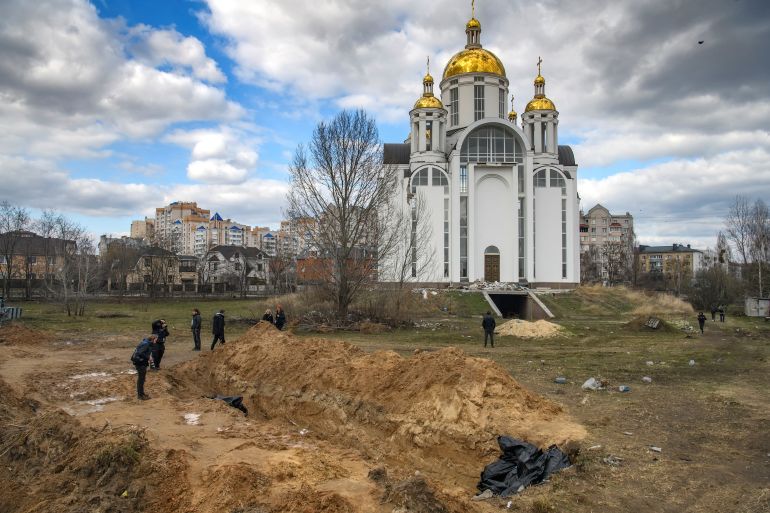
Vinnytsya, Ukraine – In mid-march, two weeks after Russian troops entered Bucha hoping to move farther southeast to the Ukrainian capital Kyiv, Viktor had been walking home.
Gun-toting soldiers stopped him to check his ID. They rummaged through his backpack to find a bottle of liquor, a torchlight and his documents.
Keep reading
list of 3 itemsRussia denies military forces killed Bucha civilians in Ukraine
France wants new sanctions against Russia after Bucha killings
Then they checked his mobile phone.
They came across the Telegram app and scanned the Ukrainian military’s channel.
Photographs of Russian soldiers and their burned tanks appeared to upset them, and Viktor believes they took their anger out on him.
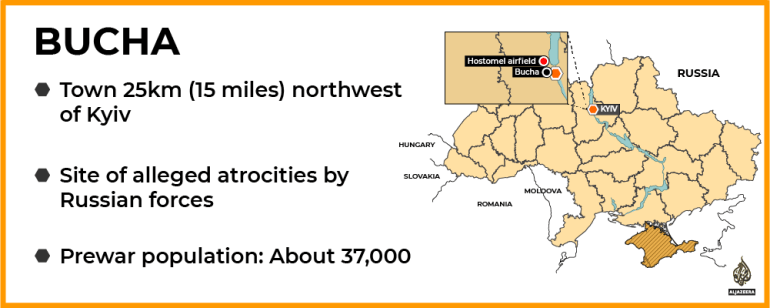
What came next was a round of torture, said Viktor, who requested Al Jazeera withhold his last name.
While Al Jazeera was unable to independently verify his account, it is consistent with a growing body of evidence linking Russian forces to atrocities in Bucha, a town northwest of Kyiv, whose name has become a synonym for harrowing mass killings of civilians.
Because of fierce Ukrainian resistance, Russian troops got stuck in and around the tranquil commuter town of 37,000, whose proximity to Kyiv triggered a construction boom in recent years.
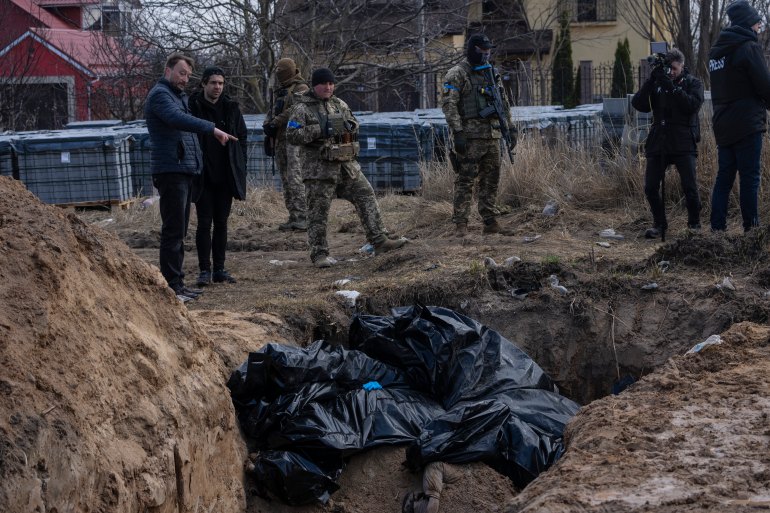
According to survivors, Ukrainian officials, human rights groups and media reports, the soldiers turned to indiscriminate, arbitrary and senseless torture and killings of civilians, to rape and looting.
Ukrainian President Volodymyr Zelenskyy fears about 300 people were killed in the town, a number Viktor says could have easily included him.
“I said I was a civilian, going home, and didn’t take any part in military action,” Viktor said in a telephone interview from his neighbour’s house in Bucha.
But the Russians decided against letting him go.
Instead, they took him to one of their headquarters on Yablunska street, which bisects Bucha and leads to Irpin, another Kyiv suburb where mass killings of civilians have been reported.
Bodies on the street
In early April, dozens of bodies of civilians killed by Russian soldiers were found on Yablunska street.
Six had their hands tied behind their back, officials said. Twenty-two more were taken out of their cars and shot dead for trying to leave Bucha.
The Kremlin has denied responsibility for the killings, calling the apparent massacre a “production” staged by Ukrainians after Russian forces retreated from Bucha on March 30.
But a New York Times examination of satellite photos and videos of the dead bodies, including those “scattered over more than half a mile” of Yablunska street, showed that the killed had been there for at least three weeks – the time when Viktor was detained and interrogated.
He said Russia’s headquarters in Bucha were in a private house with torn-down front gates, surrounded by armoured vehicles.
An officer there examined his phone again and looked at the recently erased items. The officer saw a video of a moving Russian column Viktor had taken when Russian forced entered Bucha in late February, but deleted later.
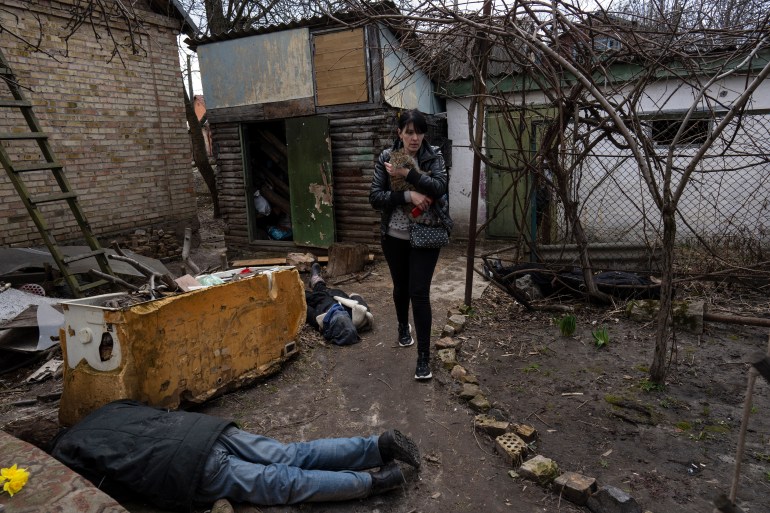
A severe beating followed.
The Russian soldiers knocked Viktor on the ground, made him turn his face towards the floor and struck him with a club, breaking his rib and finger.
They kept asking him about the whereabouts of Ukrainian forces.
But the constant repetition of their questions and indifference to his answers made him think that they simply enjoyed his helplessness.
“You understand that nothing depends on you. When they are simply taking you into nowhere. Then, there is anxiety with hope – maybe they will let you go because you’re a civilian. Not a soldier, nor a spy,” he said.
‘Let’s set him on fire’
He said the Russian soldiers doused him with a flammable liquid. He immediately recognised the smell – diesel fuel from one of their armoured vehicles.
“It wasn’t gasoline, they only have diesel. They said: ‘Let’s set him on fire and send back to his people,’” Viktor said.
“When I was completely exhausted and all covered in blood, they simply threw me in the basement, with a kick. You know – boom, and down you go.”
He rolled down the steps into the house’s dark, damp and cold basement, where the former homeowners once kept vegetables, smoked meat and glass jars with home-made pickles.
There, Viktor lay alone for some 40 minutes, still soaked wet with blood and diesel fuel – and thinking about the inevitability of death.
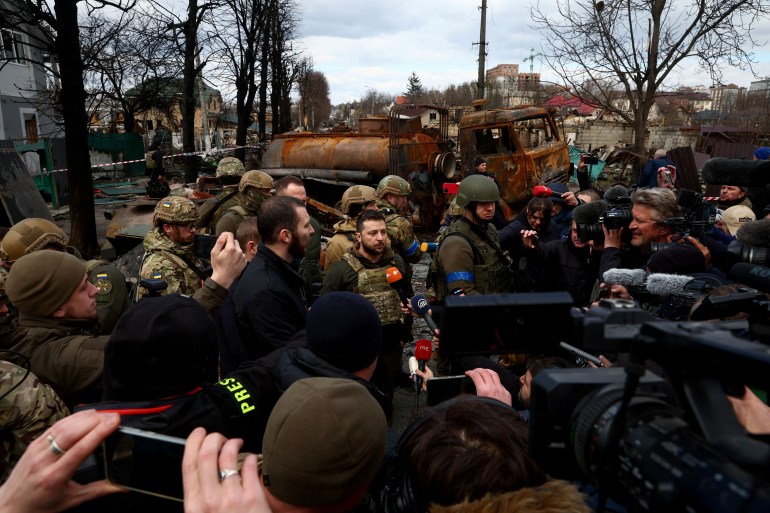
He believed the resumption of shelling spooked the interrogators and ultimately saved his life.
“They simply hid, and it saved me,” he said, describing how he later sneaked out of the basement, climbed a fence and ran home.
“I wasn’t scared to be blown to pieces, I just had to run,” he said.
Bucha was big enough for him to hide, and Russians did not look for him even though they had his backpack and documents stating his address.
He ran to his neighbour’s house, where he stayed for days, bedridden and covered in bruises.
“His whole body was blue with bruises,” the neighbour, Oleh Matsenko, told Al Jazeera.
Viktor is still there, recovering and barely able to move.
“They gave me one heck of a beating. It still hurts,” he said.